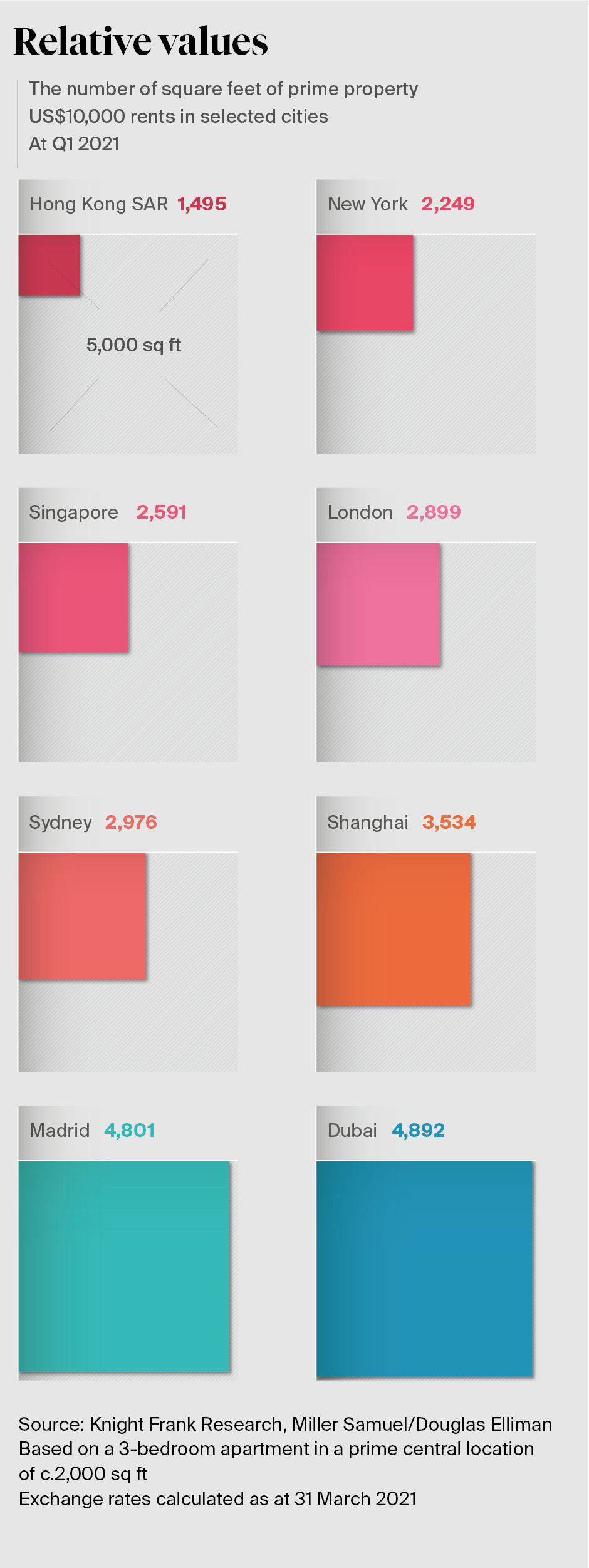Hong Kong, the most expensive city to rent a prime property
Despite the pandemic and political headwinds Hong Kong has retained its crown as the world’s most expensive city in which to rent a luxury apartment.
3 minutes to read
Prime rents in Hong Kong averaged US$6.7 per sq ft at the end of 2020, meaning a tenant with a budget of US$10,000 per month would be able to rent less than 1,500 square feet.
Our global comparisons are based on a three-bedroom apartment in a central location, but detached homes in some cities can achieve even higher premiums.
Earlier this year a house on Hong Kong’s The Peak rented for HK$1.35 million (US$174,000) a month, which on an annual basis equates to more than US$2 million a year.
Although prime rents have softened since the start of the pandemic, New York is the second most expensive market with US$10,000 a month providing US$2,250 square feet on average.
Next comes Singapore, London and Sydney which occupy the mid-rankings with US$10,000 renting between 2,500 and 3,000 square feet.
Of the eight cities we track Dubai and Madrid offer the largest space in return for rent of US$10,000 per month – 4,800 and 5,000 square feet respectively.

What impact has the pandemic had on the rental market?
When the pandemic hit corporate tenants and international students – two key sources of demand for prime rental properties in first tier cities – were amongst the first to head home or relocate temporarily. The resulting uptick in supply put pressure on rents and saw landlords forced to change their strategy to avoid lengthy void periods.
Rents in prime central London and Manhattan both fell 14% in the year to February 2021.However, as we highlighted earlier this year the tide is turning; the rate of rental declines is slowing and new lease signings are recovering in both markets. Motivated by large discounts, prime tenants are making their move back into some city centres hopeful of shorter commutes post the pandemic.
Whilst domestic demand looks to be strengthening in some cities, the easing of travel restrictions will be the key determinant for the recovery of prime rental markets globally.
Knight Frank’s Head of Prime Central London Lettings, David Mumby comments: “As soon as the passenger numbers return via the main transport hubs, we will see fairly a rapid correction of the recent rent reductions.”
He adds: “Stock will return to the short-term Airbnb rental market and with a normalisation of office occupancy, the undersupply of prime property will drive rents upwards.
We are already seeing this starting to materialise in certain areas for the very best properties and it’s only a matter of time before this feeds through to the wider market.“
What are the key reasons people rent?
- Flexibility: A rental property provides greater flexibility for those uncertain about their future plans instead of being tied to a lengthy sales process.
- Familiarisation: Some prime tenants prefer to rent whilst familiarising themselves with the local market before choosing what and where to buy.
- Positioning: In cities where primes prices are falling and are expected to do so in the short to medium term, some homeowners will opt to sell and rent enabling them to be a cash buyer once prices bottom out.
- Prohibitive purchase taxes: Several markets have raised purchase, ownership and sales costs in recent years. As an example, foreign buyers looking to purchase in markets such as Hong Kong and Singapore would have to pay between 15% and 20% in additional stamp duties on top of existing rates for domestic buyers, making renting a more attractive option.
To read our analysis on prime prices and learn how much space you can buy for US$1 million in key cities globally click here
Photo by Ruslan Bardash on Unsplash